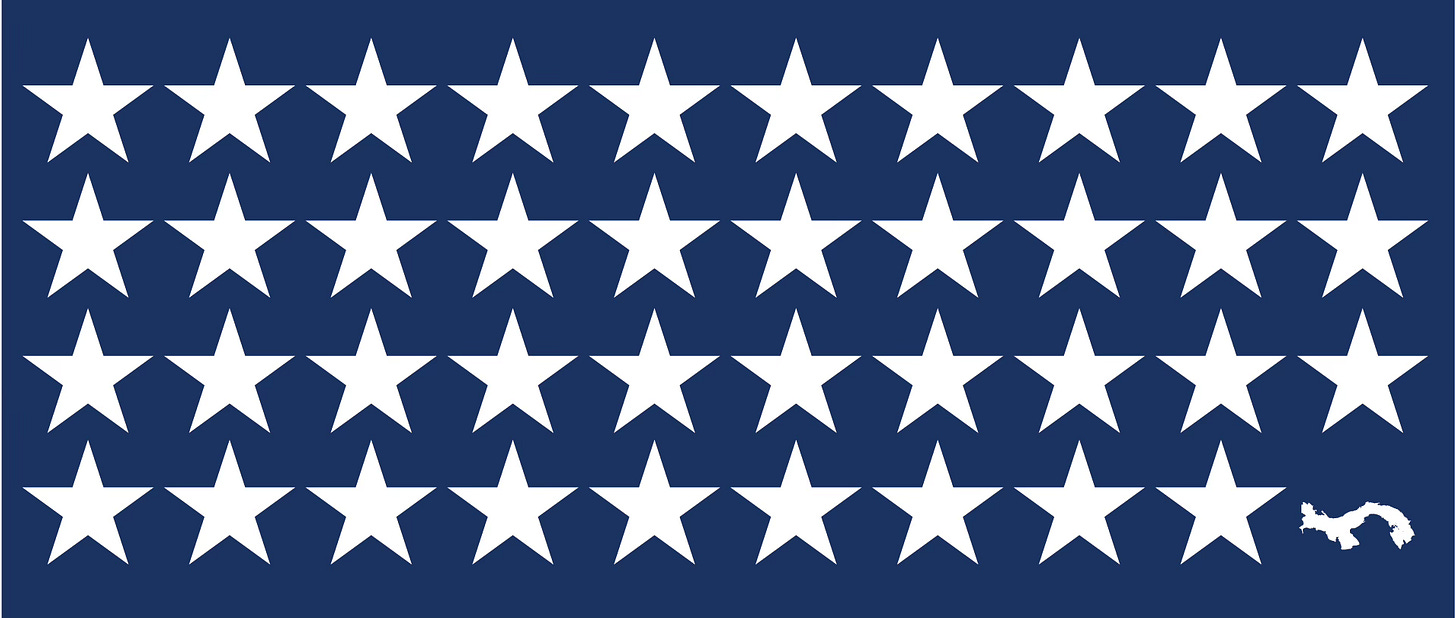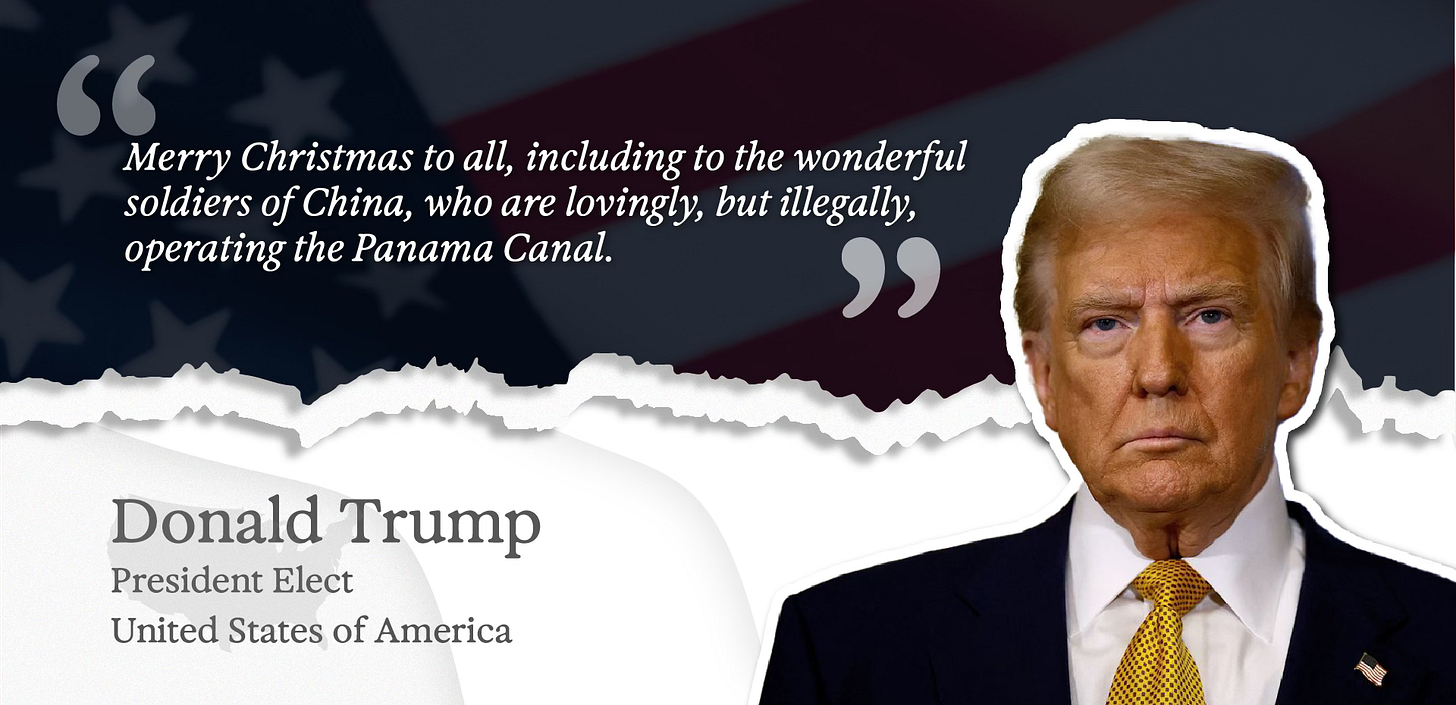Lovingly Illegal
Trump frets about China and the Panama Canal, a PRC firm's forced labor in Brazil, Chinese cyberattacks in Costa Rica, and T&T's Angostura returns to China
Welcome to Chaufa, a China-Western Hemisphere Newsletter by CPSI.
Today’s edition covers December 16 to December 30.
Listen on Apple Podcasts
The Top 5 Stories:
Brazil’s Public Labor Prosecutor forced Chinese EV firm BYD to halt construction on an EV plant. The prosecutor compared the working conditions to “slavery”, as workers had their passports and salaries withheld while working in a degrading environment. The workers had been hired by Jinjiang Construction Brazil. BYD denied the accusations.
U.S. President-elect Trump threatened to retake the Panama Canal, claiming that Panama was not living up to its commitments and that the Chinese military had special access to the canal. Panama’s President rejected Trump’s assertion of any Chinese interference at the canal, while China’s Foreign Ministry spoke up in support of Panama’s control of the waterway.
U.S. officials have long worried about the strategic implications of Chinese firms operating near the canal. Former SOUTHCOM Commander Laura Richardson would frequently raise alarm bells over the issue, but so did several U.S. senators way back in the 1990s when a Hong Kong-based firm initially took over several ports near the canal.
The U.S. government alerted Costa Rica to Chinese cyberattacks and cyber intrusions. However, the Chinese embassy predictably rejected the U.S. accusations as “defamation.”
The news comes as China’s embassy has protested San Jose’s efforts to prohibit the PRC firm Huawei from supporting Costa Rica’s 5G network expansion. This issue has been a thorn in the side of Sino-Costa Rican relations for years.
A Huawei employee based in Paraguay was caught spying on the Taiwanese embassy in Asuncion. The employee was accused of both taking pictures of the embassy as well as possibly receiving eavesdropping transmissions from inside the building.
Paraguay has long recognized the Republic of China (Taiwan) over the People’s Republic of China, but that has not prevented Paraguay and China from having limited trade and investment relations. That said, the PRC frequently uses the promise of commercial relations to try to woo Paraguayan politicians to flip their country’s ties to Beijing.
Angostura Limited, a Trinidad and Tobago company known for producing its signature alcoholic bitters, re-entered the Chinese market with its first $1 million shipment.
The country’s trade minister said the new trade opportunity could “boost foreign exchange returns to the country.”
Core Brief
The Biggest Chinese Threat to the Panama Canal Might Just Come from Donald Trump
As he’s wont to do, the U.S. President-elect spent his Christmas stirring up controversy on Truth Social, namely this week’s quote of “Merry Christmas to all, including to the wonderful soldiers of China, who are lovingly, but illegally, operating the Panama Canal.”
Obviously, there are no Chinese soldiers operating the canal, and as Panama’s right-leaning president responded, the claims were “nonsense.”
However, the canal is essential to the United States’ economic and military security. Forty percent of U.S. container traffic (representing $270 billion) annually transits the canal, while U.S. Navy ships have special rights in using the waterway. No wonder U.S. policymakers have long worried about whether PRC commerce in Panama has given the Chinese military a strategic leg-up on the canal.
This makes sorting out where China does (and doesn’t) have influence near the canal all the more important.
The Ports of Cristóbal and Balboa
Roughly since the United States returned the canal to Panama, a Hong Kong-based firm has managed two of the major ports at either end of the canal: Cristóbal on the Atlantic and Balboa on the Pacific. The firm, Panama Ports Company, is a subsidiary of Hutchison Ports Holdings and had its concession for the ports renewed for another 25 years in 2021.
Though Hutchinson has largely been able to avoid a lot of controversy in its past 25 years or so of managing the ports, its Hong Kong-based headquarters shouldn’t obscure its connection to the PRC’s ruling Chinese Communist Party (CCP). The company’s current chair, Victor Li, is a high-ranking member on the Chinese People's Political Consultative Conference (CPPCC), a high-level (if relatively inconsequential) part of the Chinese government.
Margarita Island Port
Balboa and Cristóbal aren’t the only Panamanian ports managed by a PRC-adjacent firm. Back in 2016, the China-based Landbridge Group spent $900 million to operate the port on Margarita Island and develop it into a deep-water port.
Even more than Hutchinson, private company Landbridge has quite close ties to the CCP. Its chairman is also a CPPCC member, while the firm also reportedly has a private militia with ties to the Chinese military.
Despite these three major facilities, this doesn’t mean that a Chinese firm controls all the ports on the waterway. There are a number of other major ports near the canal, with others like the PSA Terminal run by a Singaporean firm and the Colon Container Terminal run by the Taiwanese-based Evergreen Group.
Other infrastructure
Aside from the various ports right off the canal, a couple of PRC construction firms have been active near the canal. China Communications Construction Company (CCCC) and China Harbour Engineering Company (CHEC) worked on the fourth bridge over the canal, while CHEC and Belgian firm Jan De Nul recently completed the Amador Cruise Terminal on the Pacific side of the canal.
So, what’s the real threat?
Back in the 1990s when the Soviet Union could no longer provide a great bugaboo for Western intelligence, the great spy novelist John le Carre turned his eyes to transatlantic concerns that Asian powers (at that time, Japan) would somehow steal the Panama Canal. Like many of his novels, The Tailor of Panama ends in betrayal as U.S. and British forces re-invade the country due to lies and false intelligence.
It's certainly possible that one day it’ll turn out that Hutchinson or Landbridge Group have been hiding PLA soldiers or have planned to sabotage the canal. But for now, (public) evidence for ongoing sabotage is about where it was in a Le Carre novel: scarce beyond a few political connections at the Chinese companies.
Instead, Trump’s less-than-diplomatic words on the canal might just threaten the United States’ interests more than the Chinese-operated ports. As U.S. Senator Cardin (D-MD) told the press recently, Trump’s words “feeds into Russia and China appeal to other countries as to whether they need to make alliances with -- with Russia and China.”
The Roundup
Politics, society, and security
Shanghai hosted representatives from 18 countries for a China-CELAC forum on legal cooperation, specifically related to “digital economy, technological innovation, finance, trade, investment, and climate-related issues.” (China Daily)
Colombia and Ecuador will try to arrange a joint meeting with Chinese and Indian officials to develop a strategy to fight drug trafficking in the Pacific.
In retaliation for Ottawa’s sanctions on Tibet and Xinjiang-related officials, the PRC sanctioned 22 Canadian entities and individuals.
China and Nicaragua celebrated three years of diplomatic relations.
Investment, finance, and infrastructure
A consortium led by Sinopec presented an offer to develop the Sacha oil field, the largest in Ecuador, for 1.5 billion dollars.
The Bolivian public works ministry plans to meet with the Chinese embassy to discuss the long-proposed but never completed “Bi-oceanic Corridor” megaproject.
Explicitly in response to Chinese export competition, the U.S. Export-Import Bank approved a $526 million loan to Guyana for an energy project.
Panama signed a contract with U.S. company AECOM USA to “update the master plan of a train to connect the Panamanian capital with the border with Costa Rica.”
Trade and Technology
China’s Ministry of Commerce launched an investigation into beef imports, which could result in new tariffs on Argentine, Brazilian, and Uruguayan beef exports to the PRC.
The first shipment from the controversial Port of Chancay mega port arrived in China. Symbolic of Peru’s trading relations with the PRC, the first batch of goods largely comprised fruits like blueberries and avocados. (Global Times)
Ecuadorian and Chinese customs officials signed a Mutual Recognition Agreement that will facilitate customs processes and reduce time and cost for each side’s exporters.
The governor of the Venezuelan state of Aragua toured the state’s Venezuelan Anonymous Company of Military Industries with business officials from Shenzhen to discuss investments in the context of Special Military Economic Zones.
Canada’s finance ministry suggested it may impose new duties on Chinese goods in the new year it imposed tariffs on EVs, steel, and aluminum. Similarly, Mexico levied a new 35% tariff on textiles that will largely affect Chinese exports.
Taiwan
Guatemala and Taiwan celebrated 90 years of diplomatic relations in December. In a show of support, Taipei said that it would send cybersecurity experts and set up new cybersecurity operations centers in the Central American country.
The Taiwanese embassy donated 10,000 sacks of rice to St. Vincent and the Grenadines.
Society and culture
The President of Xinhua discussed media cooperation with Grenada’s ambassador to Beijing. (Xinhua)
The PRC and Honduras signed an agreement to set up seven new agriculture schools in the Central American nation. They also agreed that China would support a feasibility study for a new convention center.
In cooperation with the Bahamas Agricultural & Industrial Corporation, the Chinese embassy in the Bahamas donated “agricultural tools and equipment to empower [20] local farmers.”
The Association of Chinese Enterprises in Guyana (ACEG) donated “155 essential and hygiene items” to a geriatric home in Georgetown.
The National Orchestra of Colombia is touring China, including Shanghai, Hangzhou, Guangzhou, and Shenzhen.
Analysis and Opinion
German Padinger published a piece on CNN on the history of Chinese trade and investment in Latin America and the Caribbean.
In this week’s Monday edition of the Latin American Risk Report, James Bosworth wrote about how “Trump wants Latin America to be actively anti-China.”
That’s it for now, see you again in two weeks!
Make sure you don’t miss the next issue of Chaufa 👇



